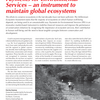Payments for Environmental Services - an instrument to maintain global ecosystems
The recent flurry of interest in Payments for Ecosystem Services (PES) is partly related to the perception that it can be used as a tool to simultaneously achieve poverty alleviation and conservation benefits. Yet the debates on the nature of this linkage are increasing. Can and should PES be used as a means to achieve poverty reduction or does including poverty as a main objective put the whole concept of PES in jeopardy? Or will a pure focus on ecosystem services forget the interest of the poor, a concern that is increasingly voiced by indigenous forest dependent communities, NGOs and development organisations. The opinion paper argues that rather than limiting the debate to the question of whether PES can or should contribute to poverty reduction more focus should be paid on how to make PES pro-poor.
As research and experiences on pro-poor PES is increasing a number of barriers have been identified that need to be overcome when designing pro-poor PES. These include high transaction costs and property rights, as formal ownership of the land that provides the ecosystem services is often regarded as a pre-condition for the realisation of a PES deal. Pro-poor PES also has to consider the heterogeneity of the people affected by the PES scheme (see e.g. Wunder 2008). This requires to take into account distributional issues as well as questions of equity and efficiency. More research on and experiences in implementing pro-poor PES in developing countries is required in order to shed further light on the complex interactions between the poor, ecosystem services and the impact of PES schemes.
Marina Kosmus
Deutsche Gesellschaft für Technische
Zusammenarbeit (GTZ) GmbH Eschborn, Germany
Marina.Kosmus@gtz.de
Doris Cordero
International Union for Conservation of Nature - IUCN
Regional Offi ce for South America- Quito, Ecuador
doris.cordero@sur.iucn.org




